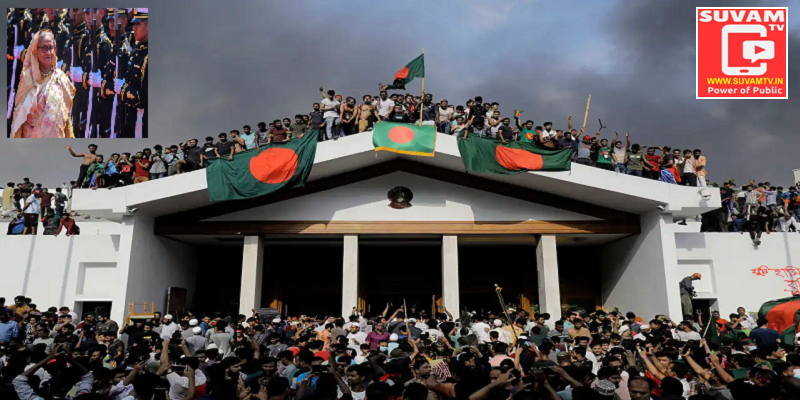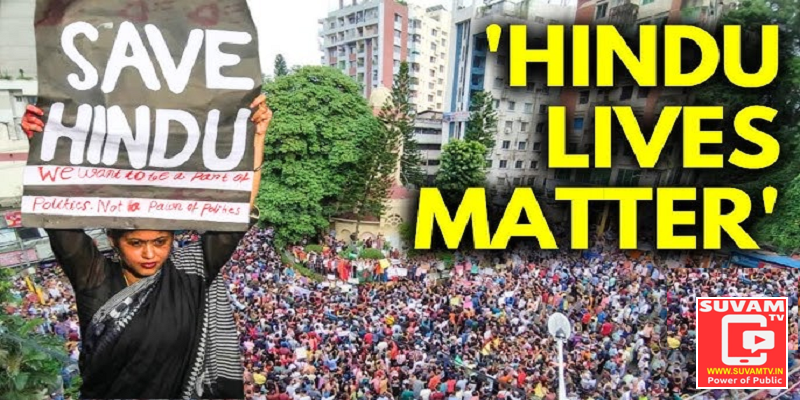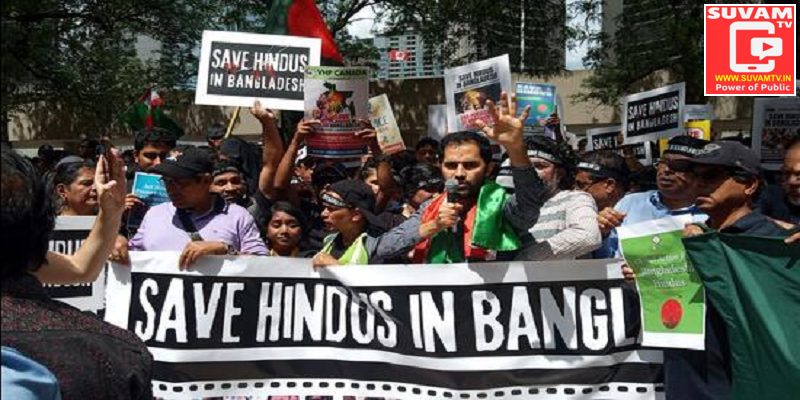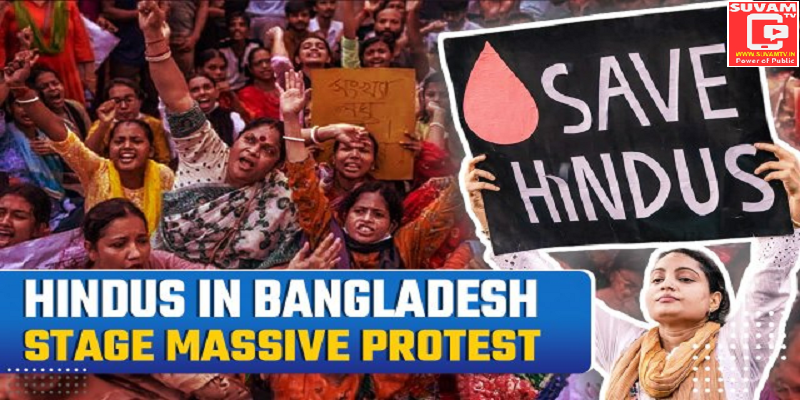Bangladesh is plagued by violence.

Prime Minister Sheikh Hasina Wajed had to flee the country as a result of the movement that started in Bangladesh demanding reservation (quota) reforms in government jobs. After the independence of Bangladesh, the reservation in government jobs for the families of the country’s freedom fighters was lifted during Hasina’s tenure as prime minister. The High Court returned that reservation in the judgment of the case filed against it by the freedom fighter families.
The student movement started demanding its cancellation. While it was initially peaceful, the movement gradually transformed into a Dabanal-like movement to overthrow the government. The Supreme Court of Bangladesh accepted the appeal of the Hasina government and annulled the High Court verdict, but Bangladesh has not calmed down. After the Supreme Court verdict, Bangladesh will be calm and Hasina government will manage the situation. But that did not happen. The pressure of the crowd was expressed in anger.
Sheikh Hasina became the Prime Minister for the first time in 1966 and served till 2001. That election was held in December 2008 under the supervision of an executive caretaker government. But in 2014, he won the election again and became the ruler. Before the 2019 elections, the opposition movement against him in Bangladesh became stronger. Hasina herself returned to the post of Prime Minister in 2019 after winning an election under the supervision of a caretaker government, but she did not accept the claim even before the 2019 election. A similar claim was raised in 2014. She did not obey him either.
Bringing Bangladesh up on the World Hunger Index, prosecuting the killers of Sheikh Mujibur Rahman and his family members, honoring the freedom struggle, ending extremism there through the Chittagong Peace Accords, promoting private industry, providing training and credit to unemployed youth, etc. Despite his government’s proactive efforts, there have been several serious allegations of human rights abuses over the past decade. The killing spree during the anti-reservation movement. Political opponents and journalists opposed to Hasina’s policies have been arrested and prosecuted in various cases.

Reporters Without Borders, an international movement for freedom of information, reported in a report in 2014 that since 2014, media freedom in Bangladesh has been undermined. Along with all this, Sheikh Hasina’s party Awami League and the party’s student body, the rise in power of the leaders and workers of the party, corruption, corruption at various levels and the ever-increasing pressure of inflation and unemployment displeased her.
Capitalist forces are always active in Bangladesh. It was this radical force that brutally murdered Sheikh Mujib and his family members on August 15, 1975. Being abroad, Hasina and her sister Rehna were exposed to this brutality. On August 4, when hundreds of people lost their lives in the conflict, perhaps Hasina’s message came from that stream of blood that it was no longer possible. The army also raised their hands from Hasina’s government on the morning of Monday, August 5. Therefore, Hasina had no choice but to resign from the post of Prime Minister. He has left the country in fear of danger to his life, possibly on the advice of the army. His life became uncertain.
Bangladesh is facing more uncertainty than this. After the news of Hasina’s resignation and her desertion of the country on August 5, a group of thousands entered the Janata Parliament Building (Gana Parishad), the Prime Minister’s residence and Bangabandhu Building, which houses Sheikh Mujib’s memorial in Dhanmandi. They vandalized, even smashed the statue of Sheikh Mujibur Rahman. There is no denying that today’s independent Bangladesh was born under the leadership of Bangabandhu Mujibur Rahman. Due to his tireless struggle, the liberation war of Bangladesh became Bengali.
Mujibur and his family were brutally murdered in this house in Dhanmandi, which has been given the status of a memorial. A black and white picture of Mujibur’s bullet-riddled body hangs on the interior wall. The walls were covered with blood stains from the bullet-riddled bodies of Mujibur and his family. All this was burnt by the maddened crowd. Furniture has also been looted from the Prime Minister’s residence.

Minority Hindus are not spared from the attack either. Fifteen left-wing democratic parties of the country have jointly called upon the countrymen to take an active role in preventing violence and ensuring the safety of people and property of the entire country, and ensuring the safety of the property and lives of religious and ethnic minorities. The Left Democratic Front has expressed its displeasure over the lack of efforts to prevent violence even though the army is keeping watch in various cities.
In Bangladesh, Nobel peace winner Muhammad Yunus was appointed as the head of the interim government, but the real power is now in the hands of the army. It is not a good sign that the army chief’s talks and talks with the leadership of the extreme right-wing Jamait-e-Islami, and not taking advice to stop the ongoing violence in the country and stop the vandalism of Bang Bhawan and Mujibur Rahman’s statue in Dhanmandi, is not a good sign. This time, the way the Bangabandhu building was burnt and his statue was destroyed in the movement demanding his removal, it has become clear that the movement has been captured by the anti-liberation forces.
Capitalist power has taken advantage. The Jamaat-e-Islami and Khaleda Zia’s Bangladesh Nationalist Party have left the students in the forefront of their flagless movement. Those who call Abyuthan as the second freedom, but the post-movement activists say, it is not freedom, but the beginning of freedom. The people of Bangladesh were in favor of those who were agitating, but today the movement has been taken over by the Maoists, which is leading the country in the wrong direction.
In Bangladesh, Nobel peace winner Muhammad Yunus was appointed as the head of the interim government, but the real power is now in the hands of the army. It is not a good sign that the army chief’s talks and talks with the leadership of the extreme right-wing Jamait-e-Islami, and not taking advice to stop the ongoing violence in the country and stop the vandalism of Bang Bhawan and Mujibur Rahman’s statue in Dhanmandi, is not a good sign. This time, the way the Bangabandhu building was burnt and his statue was destroyed in the movement demanding his removal, it has become clear that the movement has been captured by the anti-liberation forces. Capitalist power has taken advantage.

The Jamaat-e-Islami and Khaleda Zia’s Bangladesh Nationalist Party have left the students in the forefront of their flagless movement. Those who call Abyuthan as the second freedom, but the post-movement activists say, it is not freedom, but the beginning of freedom. The people of Bangladesh were in favor of those who were agitating, but today the movement has been taken over by the Maoists, which is leading the country in the wrong direction.
Bangabandhu is the name of a constellation. Whose virtues and debts are infinite. A burning vision of sacrifice and perfection. It is unfortunate that the people of Bangladesh could forget Mujibur so easily. Maybe Bangladesh is going to become another Afghanistan or Pakistan. By extinguishing the consciousness of the freedom war, the departure bell of secularism and democracy can be sounded. A so-called democratic government may run under the control of the army like in Pakistan. But Bangladesh has grown towards an uncertain future and violence.
